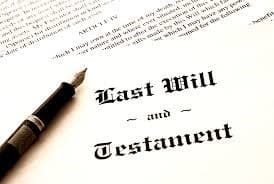Role of an Executor
In the current climate a lot of clients are focussing on making a Will or indeed updating their existing Will. One question we are often asked is who should I appoint as my solicitor or I have been asked to act as an Executor what does that mean? A person who makes a will is called a Testator.
WHAT DOES THE EXECUTOR DO?
The role of the Executor is to administer the estate of the Testator which means gathering the assets and distributing those assets in accordance with the last Will of the Testator and to carry out the Testator’s wishes. We recommend that funeral wishes are not provided for in a Will as a Will may not be read for some time after a death. After a death, the Executor will need to establish what the assets are and where they are.
WHO CAN ACT AS AN EXECUTOR?
Anybody over the age of 18 can act as an Executor. When considering who to appoint most people appoint a relative or friend but it can be a professional person.
An Executor may also be a beneficiary.
CONSENT OF EXECUTOR
An Executor does not have to give their consent to be appointed nor do you have to notify them when you make your Will. However it is common practice to advise the Executor that you would like to appoint them.
An Executor does not have to accept the appointment. They can choose to reserve of renounce their position before they commence the administration which means that they are not necessarily acting as Executor in the course of the administration of the Estate. For these reasons it is advisable that you speak to your chosen Executor when you are appointing them.
As an Executor if you reserve rather than renounce your position you can come back into the administration of the Estate at a later date.
If you renounce your position as Executor, you must sign a formal Renunciation and you cannot come back into the Administration.
If only one Executor is appointed and he or she renounces their position, then it is a more complex application in order to get a Grant of Probate.
RESPONSIBILITIES OF AN EXECUTOR
The Executor’s powers and duties commence when the Testator dies. The task ahead can seem very daunting but we at Sellors have vast experience in assisting in the administration of estates and will help you at every stage. An Executor’s role is an important one and we can help you with the onerous tasks of notifying financial institutions, insurance companies, employers, pension companies/social welfare, speaking with tax advisors, valuers and other professionals.
An Executor cannot delegate his or her role but an Executor can employ others to help them for example solicitors, accountants or tax advisors.
The Executor’s role is to prove the Will of the Testator which involves makes a return to the Revenue Commissioners detailing the assets of the Testator and making an application to the Probate Office. Once a grant of probate issues the Executor is obliged to ensure that the terms of the deceased will are complied with and distribute the Estate.
Dealing with the Estate of a Testator particularly when you are grieving can be very difficult and stressful. We can assist you at every step and make the process as seamless as possible for you.
If you have any queries on the appointment of an Executor or if you have been asked to act as an Executor please contact Mary Ryan at Sellors at [email protected]

